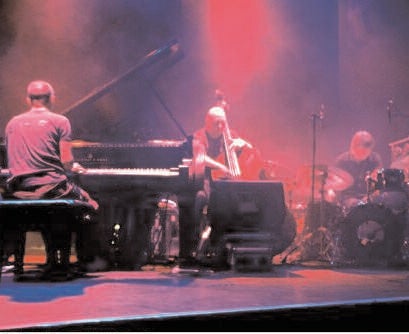Talking jazz: Scandinavian cool

Your support helps us to tell the story
From reproductive rights to climate change to Big Tech, The Independent is on the ground when the story is developing. Whether it's investigating the financials of Elon Musk's pro-Trump PAC or producing our latest documentary, 'The A Word', which shines a light on the American women fighting for reproductive rights, we know how important it is to parse out the facts from the messaging.
At such a critical moment in US history, we need reporters on the ground. Your donation allows us to keep sending journalists to speak to both sides of the story.
The Independent is trusted by Americans across the entire political spectrum. And unlike many other quality news outlets, we choose not to lock Americans out of our reporting and analysis with paywalls. We believe quality journalism should be available to everyone, paid for by those who can afford it.
Your support makes all the difference."No matter what Scandinavians themselves say," says Radio 3's Fiona Talkington, when asked to explain her personal attraction to Scandinavian jazz, "I find an addictive and very compelling reserve about the music. There's a humility in it, even when someone's going musically full tilt."
As presenter of the Late Junction show, Talkington has done more than most to bring this music to the UK, having been first enchanted by relatively high-profile ECM-signed artists like guitarist Terje Rypdal and saxophonist Jan Garbarek. Yet while the likes of Mathias Eick, Frode Haltli and Tord Gustavsen could be seen as continuing this tradition, Talkington is keen to point out that not all subsequent artists share Garbarek's famously icy, introverted tone. Rather, she insists, "some of the most invigorating Norwegian music comes from feeling your guts being ripped out!"
Indeed when Bugge Wesseltoft performed at Scene Norway, a 10-day programme at last year's London Jazz Festival, his set was at times closer to industrial electronics than any traditional notion of jazz. The sentiment is borne out too by a visit to Norway's numerous jazz festivals: in Kongsberg last summer, one could catch the occasionally pugilistic improvisation of the Supersilent quartet; at the smaller Punkt festival, artists such as trumpeter Nils Petter Molvær married jazz to cutting-edge electronics.
Yet it's not just Norway. A vibrant jazz scenes exist right across Scandinavia. Indeed, perhaps the most internationally visible Scandinavian jazz musician of recent years was Swedish pianist Esbjörn Svensson. When he died last year aged just 44, his trio, EST, had already become the first European jazz act to appear on the cover of America's prestigious Down Beat magazine.
Compatriots continuing Svensson's good work include pianist Bobo Stenson, saxophonist Jonas Kullhammar, trumpeter Peter Asplund and double bassist Lars Danielsson. It is saxophonist Mats Gustafsson, however, who perhaps best epitomises Talkingon's notion of "going full tilt" – anyone expecting easily digested, fjord-inspired meditations would likely have a heart attack when exposed to his utterly ferocious take on free jazz.
Denmark, too, is home to some excellent players, including pianists Jacob Anderskov and Søren Kjærgaard, and guitarist Jakob Bro, and the same is true for other Nordic countries. Promising new generations are emerging from both Iceland and Finland, ranging from "nu jazz" collective Nuspirit Helsinki to The Five Corners Quintet.
Quite why these countries should, in the last three or four decades, have conceived such convincing – and distinctively non-American – takes on jazz is open to debate. Significant factors, however, surely include significant government support and strong music education programmes, such as the Sibelius Academy Jazz Department in Finland.
In truth, factors vary from country to country, as does the music itself – and talk of a unified "Nordic sound" is to some extent misleading. Yet, given that jazz is often regarded as a niche concern in the UK, it remains inspiring to look across the North Sea to countries where the music more readily rubs up against other genres, and hence more easily escapes the segregation of the so-called "jazz ghetto".
Norway's superb Rune Grammofon label, which next month celebrates its 10th anniversary with a hardback book of sleeve artwork, showcases this open-minded philosophy. Its founder, Rune Kristoffersen, says in the enclosed interview: "I can listen to free jazz and I can listen to classical music and I can listen to Jimi Hendrix and I can listen to Aphex Twin. Everything is, in one way or another, the same for me."
Enjoy unlimited access to 100 million ad-free songs and podcasts with Amazon Music
Sign up now for a 4 month free trial (3 months for non-Prime members)
Enjoy unlimited access to 100 million ad-free songs and podcasts with Amazon Music
Sign up now for a 4 month free trial (3 months for non-Prime members)
Rune Grammofon's anniversary book, Money Will Ruin Everything 2, is released as a hardback book and double CD on 30 March.
Frode Haltli performs in the D'Amore concert, part of ECM Live, at King's Place, London, on Saturday 21 March.
Lars Danielson's new album Tarantella is released by ACT on 2 March.
Mathias Eick is on tour in the UK from 22-29 April.
THE BEST OF THE FESTIVALS
Norway, Molde Jazz, 13-18 July / Kongsberg Jazz Festival, 1-4 July 2009
Sweden, Stockholm Jazz Festival, 16-19 July 2009 / Umeå Jazz Festival, 21-25 October 2009
Denmark, Copenhagen Jazz Festival, 3-12 July 2009 / Aarhus Jazz Festival, 11-18 July 2009
Finland, Pori Jazz, 11-19 July 2009
Iceland, Reykjavik Jazz Festival, 13-31 August 2009
Join our commenting forum
Join thought-provoking conversations, follow other Independent readers and see their replies
Comments